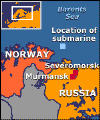




|
MURMANSK, Russia -- Russia has controversially signed a contract with a Dutch
company to
help raise the sunken nuclear submarine Kursk a day after breaking off
an earlier deal.
Deputy Prime Minister Ilya Klebanov, who is in charge of the project, signed the agreement in Moscow with Netherlands-based Mammoet Transport BV. Mammoet is a major operator of heavy-lift cranes, but has no experience in raising vessels. The deal comes a day after Russia said it would no longer co-operate with a consortium of Dutch and Norwegian companies, which said the operation could not be safely undertaken until 2002. The Kursk sank in the Barents Sea last August in unexplained circumstances, with the loss of all 118 men on board. Safety fears On Monday, Mr Klebanov said a deal would be signed within days with the consortium of Dutch firms Smit International and Heerema, and the Norwegian arm of the US firm Halliburton. Three days later Russian officials formally broke off the talks, refusing to fulfil the companies' demand to delay the lift until next year. Smit responded with a statement saying that the consortium would not "endanger their workers and equipment, nor the wreck, the victims or the environment by conducting a hurried salvage operation this year". Niels Burmer from the Bellona Foundation, an environmental organisation based in Norway, said the decision was worrying, as it meant Russia was determined the raise the Kursk before the end of this year, disregarding the risks. He accused Mammoet, which he says has had no experience in heavy lifting, of agreeing to go ahead with the deal for publicity. He added that Mammoet had lowered the price of the deal from $70 million to $50 million and agreed to a $500 million liability plan in case something went wrong. However, David Weber, a spokesman for the Kursk Foundation, which is committed to minimising the damage caused by the sunken submarine, said the foundation welcomed any progress, but would continue to insist on safety. "A contract has been signed with Mammoet as the lead company. It is not certain whether other companies will now be invited by Mammoet to participate in a new proposal. "Clearly if there were companies from the old consortium who had a role within a new consortium, this would indicate a continuity that would be welcomed by the international community," Mr Weber said. Missiles A dozen bodies have already been retrieved by Norwegian divers. But the rest of the crew, as well as two nuclear reactors and roughly 22 missiles are still on the 14,000-tonne submarine which lies at a depth of 100 metres. Some relatives of the victims do not want the remaining bodies brought to the surface, while environmentalists fear the submarine will break as it is lifted, causing a leak of radiation. On Thursday a Russian admiral said he thought it would be hard to find any partner to agree to lift the submarine this year. Rear-Admiral Yuri Senatsky, the Russian Navy's chief engineer, said: "There is simply no time to prepare, especially as some serious preparatory work, involving unique technical equipment, should be done." European states are ready to contribute a significant amount, once agreement has been reached on a wider programme of co-operation to clean up nuclear pollution left over from the Soviet Union. |
Here are some pictures of the Kursk :
 |
 |
 |
 |
 |